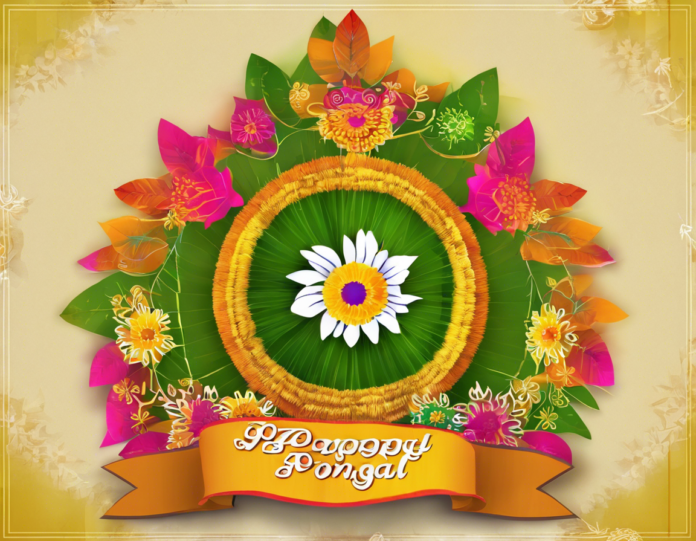Pongal is a traditional harvest festival celebrated largely in the South Indian state of Tamil Nadu and other parts of South India. The festival typically falls in January, marking the end of the winter solstice and the start of the sun’s journey northwards. This auspicious occasion is a time for giving thanks to nature, celebrating abundance, and seeking blessings for a fruitful year ahead.
The Meaning of Pongal
Pongal gets its name from the sweet dish that is the hallmark of this celebration. Pongal, the dish, is made from freshly harvested rice, jaggery, milk, and other ingredients, symbolizing prosperity and bounty. The cooking of Pongal also signifies boiling over or overflowing, signifying the abundance and prosperity that people wish for in the upcoming year.
Four Days of Festivities
Pongal is celebrated over four days, each with its own significance and rituals:
1. Bhogi Pongal
The first day, Bhogi Pongal, is when people clean and decorate their homes. They discard old belongings and welcome new things into their lives, symbolizing a fresh start.
2. Thai Pongal
Thai Pongal, the main day of the festival, is when the Pongal dish is prepared and offered to the Sun God, Lord Surya, as a gesture of gratitude for a bountiful harvest.
3. Mattu Pongal
The third day, Mattu Pongal, is dedicated to cattle and livestock, which play a vital role in agriculture. Cows are bathed, decorated, and worshipped on this day.
4. Kaanum Pongal
The final day, Kaanum Pongal, is a day for family gatherings and outings. People visit friends and relatives, exchange gifts, and enjoy traditional games and cultural activities.
Traditional Rituals and Customs
Pongal is steeped in traditions that have been passed down through generations. Some of the common rituals and customs observed during the festival include:
- Kolam – Intricate patterns made with rice flour at the entrance of homes to welcome guests and ward off evil.
- Pongal Chores – The process of cooking Pongal in earthen pots until it overflows is a ritual that symbolizes prosperity and good fortune.
- Sugarcane Decoration – Decorations with sugarcane and turmeric plants symbolize fertility and abundance.
- Offerings to Deities – Prayers and offerings are made to the Sun God, Lord Indra, and other deities for a successful harvest season.
- Traditional Attire – People dress in new clothes, typically in vibrant hues, to mark the festive occasion.
Festive Foods and Delicacies
Apart from the iconic Pongal dish, the festival is a time to indulge in a variety of traditional South Indian delicacies. Some of the must-have dishes during Pongal include:
- Sakkarai Pongal – A sweet version of the Pongal dish made with jaggery, ghee, and cashews.
- Vadai – Crispy lentil fritters that are a popular snack during the festival.
- Payasam – A sweet dessert made with milk, rice, jaggery, and flavored with cardamom and nuts.
- Sundal – A savory snack made with boiled legumes like chickpeas or black-eyed peas.
Significance of Pongal in Agriculture
Pongal is not just a festival for celebration but also holds immense agricultural significance. Farmers mark this time to express their gratitude to nature and the farm animals that help them in their profession. It is a time to pray for good rain, fertile soil, and abundant crops in the coming year.
FAQs about Pongal
1. What is the history behind Pongal?
Pongal has been celebrated for centuries, dating back to the Sangam period in South India. It is a festival that honors the Sun God and nature’s bounty.
2. How is Pongal different from other harvest festivals in India?
While most Indian harvest festivals celebrate the harvest season, Pongal specifically focuses on the worship of the Sun God and the offering of Pongal dish as a form of thanksgiving.
3. What are some traditional games played during Pongal?
Games like Uri Adithal (pot-breaking), Kabaddi, and village sports are popular during Pongal festivities, adding to the merriment and joy of the celebrations.
4. Can non-South Indians also celebrate Pongal?
Pongal is a festival of joy and gratitude that can be celebrated by people from all backgrounds. It is an opportunity to immerse oneself in South Indian culture and traditions.
5. Are there any environmental considerations during Pongal?
The use of traditional clay pots and eco-friendly decorations during Pongal is encouraged to promote sustainability and reduce environmental impact during the festivities.
6. How can one send heartfelt Pongal wishes to friends and family?
Sending personalized messages, sharing festive greetings on social media, or even sending traditional gifts like sweets and flowers are great ways to convey Pongal wishes to loved ones.
Pongal is a time of joy, gratitude, and togetherness. It is a celebration of nature’s bounty and a reminder to appreciate the gifts that life has to offer. Whether you partake in the traditional rituals or simply enjoy the festive delicacies, Pongal is a time to cherish and create memories with loved ones. Let this Pongal be a harbinger of prosperity, happiness, and fulfillment in your life.

